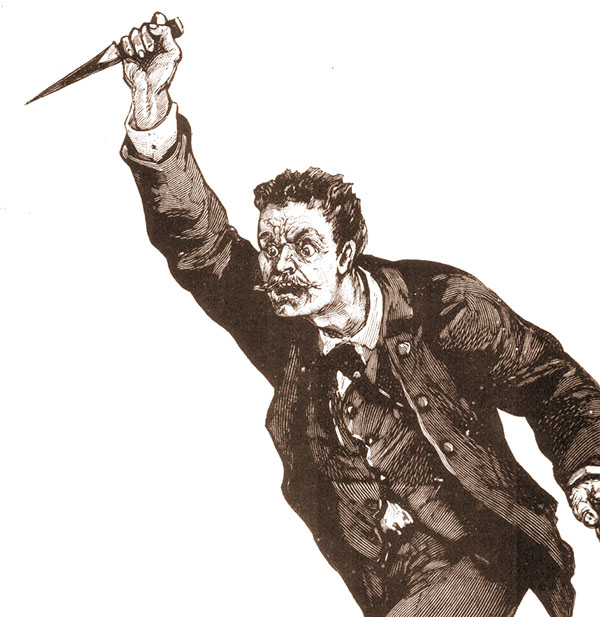
Some people think it is a foregone conclusion that many of their fellow citizens will turn savage if the constraints of “normal” society falter. Will shortages and confinement turn us into brutes?
Is our basic human nature so wanton that only the constraints of government (police, courts, prisons) keep people on the rails? Are we all ravening wolves inside, kept in check only by the fear of getting caught? Would a collapse of the civil order release all the wolves to prey upon the weak? Would the failure of our current supply chain prompt food riots, mayhem, looting, and violence? Everywhere?
I recently came across an extended quote from an essay entitled Human Nature in History, by Herbert Butterfield (1900-1979). He felt that the historical record showed that human nature deserved a lower view than was common in twentieth-century thinking. Indeed, the late 19th and 20th-century progressive view is that man is essentially “good” and only needs to be freed from oppression and poverty in order to express his “innate goodness.”
Butterfield disagreed with the progressives. “…the study of history does open one’s eyes to a significant fact…if you were to remove certain subtle safeguards in society, many men who had been respectable all their lives would be transformed by the discovery of the things which it was now possible to do with impunity; weak men would apparently take to crime who had been previously kept on the rails by a certain balance existing in society.”
The Bible certainly makes it clear that human nature is, at its core, selfish and corrupt. Here are just a couple of verses along that line. “The heart is deceitful above all things, and desperately wicked, who can know it?” (Jeremiah 17:9) “None is righteous, no not one.” (Romans 3:10)
Butterfield believed that men who “throughout their lives it had never occurred to them even to want to steal,” would plunder and steal if they thought they could get away with it. The “seamy side of human nature amongst who, cushioned and guided by the influences of normal social life, have hitherto presented a respectable figure to the world.”
(quoted in John C. Lennox’s book, “Gunning for God,” page 132)
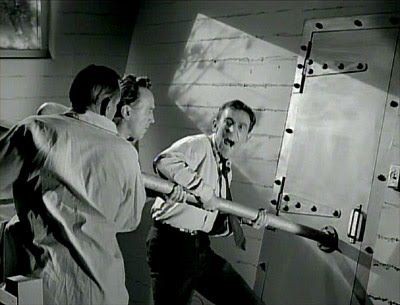
The failure of this thin veneer of civility was the theme in the Twilight Zone episode “The Shelter” (Season 3). In that story, a collection of neighbors, all cordial and polite, turn on each other when they think a nuclear attack is coming and there is not enough room in the bomb shelter for everyone.
The prospect of such a brutal unraveling of civilization weighs heavily on the modern imagination. Is this really who we are? Are we nice to each other only because the air raid sirens have not (yet) sounded?
On the next page of Lennox’s book, he cites the looting and destruction during the New York blackout of 1977 as an example of what happens when human nature thinks that “no one is watching.”
Blackout & Mayhem
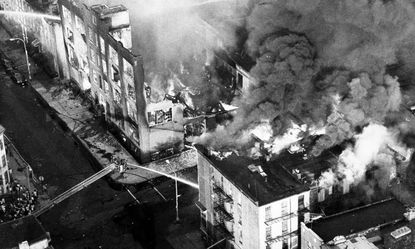
Back on the night of July 13th, 1977, a series of lightning strikes took out power to the Big Apple. People were suddenly plunged into darkness. Almost immediately, looting and arson began. By morning, thirty-five blocks of Broadway were destroyed. Lennox quotes “Well-known behavior psychologist Ernest Dichter (who) said: ‘It was just like Lord of the Flies. People resort to savage behavior when the brakes of civilization fail’.” (Lennox, p.133)
There have been many times when governments have lost control and mayhem ensued. Think of the LA riots in 1992 over the Rodney King verdict and angry young men pulling Reginald Denny from his truck and nearly killing him. Think of the Ferguson riots. Is that what awaits us when there is no more toilet paper to be had?
Maybe not
As bad as the blackout of ’77 was, New York City did not always turn into a Mad Max hellscape every time the grid failed. There were blackouts of greater severity in 1965 and 2003 and yet crime was actually lower than average during those two blackouts. Human nature had not changed. The heart is still deceitfully wicked. Yet, mayhem did not always break out. Indeed, in 1965 and 2003, there was more camaraderie and strangers helping strangers.
Further, during the 1965 and 2003 blackouts, power was out over all of New York State and several other states. Riots and looting did not break out in rural areas or small towns, even though they were equally dark. Clearly, there is more to the equation than just the animal side of human nature and sudden darkness.
What was different in 1977 from ’65 and ’03?

Note the mixed races being calm.
In the 1965 outage, it happened at 5:30 p.m. Many shop owners were still in their stores, so they were on-hand to protect them. It was November 9th: cold enough to discourage roaming streets after dark, looking for trouble. In 1965, LBJ’s “Great Society” was only a few years old. It had not had time yet to fail. The feeling of entitlement had not yet pervaded low-income culture.
In 2003, the outage also happened in the late afternoon. Being mid-August, the weather was more amenable to being out at night, but the city was just two years post-9/11. There was still an egalitarian spirit in the city.
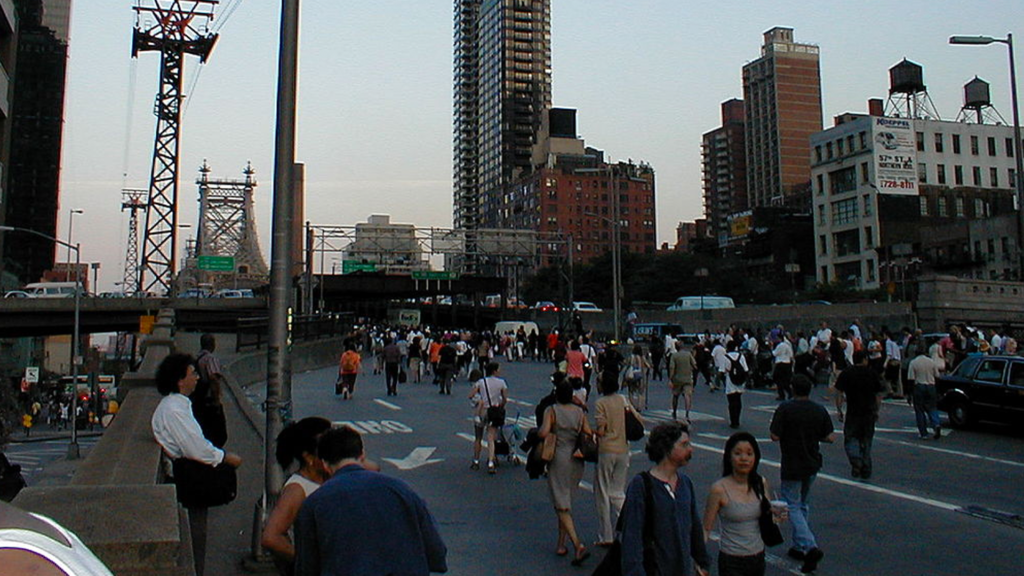
In 1977, the outage hit after 8:30 p.m. — after shop owners had gone home. Stores were unguarded. The city was several years into a financial crisis (near bankruptcy), having suffered cutbacks in services, higher unemployment and economic hardship from the recession of the mid-70s. These effects were more keenly felt by the low-income residents who had become much more dependent upon government assistance. Twelve more years of failed government programs had built up a cache of frustration and resentment. The sudden outage became an opportunity to grab a little.
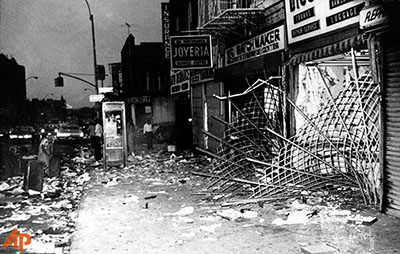
A black teen during the 1977 blackout, recalled for a Newsweek interview that, “Being that the lights are out and the niggers are going hungry, we’re going to take what we want, and what we want is what we need.” (Slate, Aug 15, 2003)
“Need” or “Hungry” are surprisingly elastic terms. The looters hot-wired and stole fifty Pontiacs from a Bronx dealership. They stole TVs, jewelry, sneakers, and liquor — all vital nutrients, of course. Aspiring rappers took the opportunity to loot sound equipment. The outage is said to have given a quick surge to the fledgling hip-hop genre with so many DJs suddenly equipped with quality sound systems.
Such opportunism is certainly lawless but not particularly animalistic. The looting of 1977 may not be a useful indicator of how your neighbors might respond in a prolonged crisis. As 1965 and 2003 demonstrated, there is more to the mix than just human nature.
It’s a Jungle Out There
Even without frequent police presence, courts, lawyers and jails, rational people (even with their fallen human nature) recognize the law of the jungle. One associate I was talking with early on the TP shortage said that he did not need to stock up on toilet paper because he had stocked up on bullets. He (semi-jokingly) said he would just take what he needed from those who had hoarded. I responded (semi-jokingly) that his plan was a fine plan until he ran into someone with both TP and bullets. The look on his face was priceless. Had he not imagined that someone might resist his attempted plunders?
In disarmed societies (such as Venezuela or gun-free Chicago) the armed can rule over the unarmed with cruel impunity. In NYC, 1977, the shops were empty and unprotected. In an armed society, easy-pickings are not so assured. In the 1992 LA Riots, Korean shops were defended. No one looted them. In the Ferguson riots, defended shops were not looted.

The lack of government control becomes a sort of laymen’s arms race. A gang of marauders can overpower a single homeowner, but a neighborhood defense group, like LA’s Koreans, can defeat a gang. Larger criminal gangs spawn still larger defensive militias until a new sort of frontier order settles in.
Just as it is a facet of human nature to want to steal and kill, it is also human-nature for husbands to protect wives, children, and homes — heck, mothers can become as fierce as bears to protect their babies. These are also very strong features of human nature that do not rely on government services.
Mitigating Factors
Just as the 1977 blackout’s underlying situation differed from 1965 or 2003, any new breakdown will have its own underlying situation to be considered. It would be wise to take an honest stock of your community. If there are festering racial tensions, mistrust, or economic resentment, then you can probably expect 1977-style trouble if the social order breaks down. Human nature will take advantage of a crisis to “settle the score.”
If your community is not so tense, then all hell might not break loose so easily. You might not have to live in fear of a Twilight Zone meltdown. Trouble may still come your way but in all likelihood, it will probably come in slower steps.
The trick is an honest assessment. If you’re living in, or near, a social powder keg, be prepared for it. If not, you probably do not have to freak out with worry.
But, what about you? Do you picture things becoming more like 1977 and less like 2003? And then, what do you base it upon?
—

Mic pretty good. Some thoughts for you. Illegal drug use is higher than even a decade ago. LEGAL Drug Use is Far higher than a decade ago.
A lot of folks “need” mood altering drugs like anti-depressants and pain control with opioids than ever before in American History. Some numbers I trust bring both categories in the 20%+ range. So around 1 in 5 people around you have a drug issue. They are likely functional right now but….
China and India are the suppliers of the legal drugs AND they are NOT Shipping if you notice Port of LA shipping layoffs. I understand from law enforcement friends and other sources that illegal drugs are in very short supply also.
So even your “Normally Nice” neighbor might be VERY interested in what you have in your bathroom medicine cabinet as Stress builds up and their scripts run out.
The riots you mention above had little to do with HUNGER. Mainly rage and a chance to do some “Shopping”. Nothing is as dangerous as a mother hearing that her children are HUNGRY.
3 meals to anarchy someone smarter than I said. Food riots, EBT failures, Power Grid Issues with too many linemen down from COVID19 or fear of COVID19 could be BAD.
And lets add in the massive us against them Political Situation. When has it ever been in America that you can be beaten for wearing a MAGA type hat in public? Yes ONLY During the raging 1970’s era.
Ecclesiastes 4:12 Though one may be overpowered, two can defend themselves. A cord of three strands is not quickly broken.
Are you blessed with trusted friends? Often more important than money.
Hi Michael,
You’re right that the rioting and looting of 1977 had nothing to do with real hunger. That was one of my points. People (looters) always frame their crimes as necessary to maintain life whereas the reality tends to be crimes of greed and envy. NYC’s 1977 looters were not stealing food to feed their babies.
Yes, dependency on drugs multiplies the problem. Where earlier folks said we’re three meals away from anarchy, perhaps today’s update would be: We’re two missed doses away from anarchy. That said, the anarchy still seems to be dependent upon population density. Riots require numbers. Urban centers have that population density for discontent to feed upon itself. Out in rural (or even suburban) areas, people are too dispersed to easily agitate each other into action. An upset rural guy might get mad (or desperate) enough to walk down the road and try to kick in his neighbor’s door, but the likelihood of that original upset guy finding a bunch of similarly upset guys to form a roving mob is pretty slim. Rural discontents will tend to burn themselves out rather than self-sustain.
My point is that the dense inner cities is where the trouble will be, not everywhere.
Mic your point is well taken. More people more troubles.
However how many of us are “Expecting” a neighbor to “Get Desperate” enough to betray our Trust in them by a hostile visit?
How many folks walking up all “Friendly” like with a hidden knife (let alone a pistol) do you need to have a *Ahem* “Personal Emergency Situation”?
My defensive efforts are to unknown and expected to be potentially hostile folks, Not my neighbors.
But as we’ve discussed in our emails the Platinum Horde (Since Rawls has discredited the “Golden Horde” concept) of city folks driving out to small towns recently attempting to strip them of supplies (mainly TP and now food) shows that mobility really extends the radii of hazards.
I was frankly surprised that folks would spend nearly a tank of gasoline to “Legally Raid” a neighborhoods grocery stores. BUT here we are.
I was NOT surprised that out of area people were moving into their “Vacation Homes” to escape the Hot Spots cities. Sorry to say bringing the very troubles they were “escaping” from. The ski towns are getting really concerned about this in MT and CO from NPR reporting.
It will become “Interesting” when several folks want to claim their Time Share right now given the recent gun and ammo panic buying.
I was also frankly surprised that State Governors would TELL tourists and such to Stay Away and even place National Guardsmen out there to check ID’s. For NOW that’s been reduced mostly to “Asking” them to “Self Quarantine” for 14 days after they arrive. Like THAT has been shown to be honored very well.
Strange times we are living in. My point was simply become aware that otherwise “Normal” friendly folks “MAY” become scary if their Legal Drugs run out or otherwise feel they NEED some food for their families.
Hi Michael,
Drug withdrawals is an important concern, however, the percentage of addicts in withdrawal that become violent (home invasion) as a result is probably not as great as you suggest.
The symptoms of meth withdrawal include depression, fatigue/sleepiness, anxiety and some psychosis (hallucinations, delusions, etc.)
Opioid and heroin withdrawal: aches and sweating
Cocaine: restlessness, exhaustion, depression.
While it is true that a delusional former addict can be violent and dangerous, how likely is it for them to present a cool, calm, and trustworthy facade?
If a stranger or a neighbor comes to your door exhibiting odd behaviors, one should certainly stay on guard and not be too trusting. At the other end of the spectrum, do we really want to live like the people in that other famous TwilightZone episode: The Monsters are Due on Maple Street and regard everyone as a likely monster?
To your other point about strangers moving into rural hinterlands as refugees from locked-down cities, that does increase the number of strangers. Watchfulness is always better than complacency.
Yes, people will turn savage. They have been led down a path of the Gov will help you and the stores and banks will always be open. Once the lie is seen, they will become the grasshopper mentality…
So, then what do you do to prepare for the angry/savage grasshoppers? It seems like part of the planning is a forecast of how many grasshoppers will be close enough around you to pose a problem.
You can only take care of you and yours. You cannot store enough to satisfy everyone who comes to your door. You will have to get tuff and protect what is yours. Why should you and your family suffer because many people did not.
How do you protect what you have?
try to live in a rural area
try not to draw attention to yourself
dogs to patrol your property
you know the rest……….